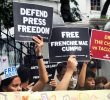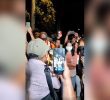We mark World Press Freedom Day with recent reminders of the risks that journalists in the Philippines, especially those among the alternative and regional media face.
On Sunday, May 2, police raided the house of student journalist Justine Mesias in Daraga, Albay. Mesias, senior editor of college publication Cassipi Online of Bicol University, was not home at the time of the raid although police — brothers in arms of the Masbate City Police Station that had recently red-tagged him online — claim they recovered a pistol and explosives from his house.
On April 24, Northern Dispatch reported Khim Abalos and his companions, who had travelled to Tinglayan, Kalinga to attend the unveiling of the Anti-Chico Dam Struggle Heroes Monument there were harassed by town police and told people from leftist groups were not welcome in Tinglayan.
There have been 51 documented cases of intimidation of journalists between June 30, 2016 to April 30, 2021. Of those cases, 30 involved red-tagging and 22 happened during the pandemic.
The practice of labeling activists, government critics and journalists as enemies of the state has also gone beyond harassment and intimidation.
Manila Today’s Lady Ann Salem, arrested last December, also over guns and explosives charges has been freed and the case against her has been junked.
But Tacloban City journalist Frenchie Mae Cumpio remains in detention over guns and explosives that police also said they found in a raid on February 7, 2020. Cumpio, who had been reporting on human rights issues and land grabbing, had reported surveillance and intimidation prior to her arrest.
Journalists also face cyberlibel cases and for allegedly spreading ‘false news’ under the Bayanihan law for reporting on local issues, including on the government’s Social Amelioration Program.
We mark World Press Freedom Day with questions still hanging over the Anti-Terrorism Act that we view as a threat to many civil liberties, including the freedom of expressiona and the freedom of the press.
Already, a general has hinted that a journalist who wrote about Aeta farmers asking to join as petitioners against the case could face charges. This was after the general called her a “propagandist for terrorists.”
We mark World Press Freedom Day with the grim reminder that ABS-CBN was ordered off the air nearly a year ago and that cases against Rappler have continued to mount.
But even if we mark World Press Freedom Day with many reasons to be fearful, we mark it also with hope, knowing that there are many of us still working each day to gather facts and shine a little light on what is happening in the country and on what isn’t.
We mark World Press Freedom Day with the hope that that the struggles and hardships we faced in the past year have made our resolve stronger and have made us more willing to support — and, when warranted, correct — each other.
Generations of journalists in the Philippines, and in the world, have faced threats and risks in relation to their work and the best response to these is nothing new either. And that is for us to work together to ensure that each of us is safe to be the independent monitors of power that we are supposed to be.
We mark World Press Freedom Day with the challenge to be free and to insist on being free.





![[ANALYSIS] A different drug war](https://davaotoday.com/wp-content/uploads/2024/09/1000019103-110x100.png)




